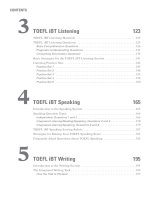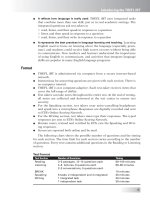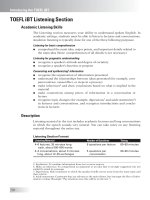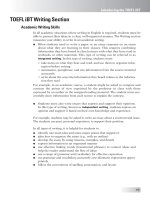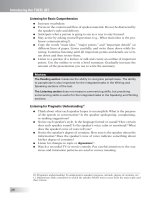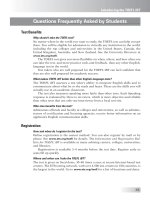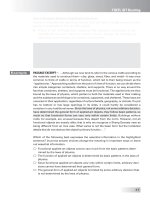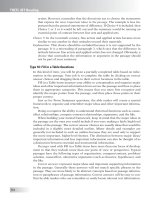The official guide to the toefl ibt third edition part 35 pdf
Bạn đang xem bản rút gọn của tài liệu. Xem và tải ngay bản đầy đủ của tài liệu tại đây (110.13 KB, 7 trang )
b
Many students choose to attend schools or universities outside their home
countries. Why do some students study abroad? Use specific reasons and
details to explain your answer.
b
People listen to music for different reasons and at different times. Why is
music important to many people? Use specific reasons and examples to sup-
port your choice.
b
Groups or organizations are an important part of some people’s lives. Why are
groups or organizations important to people? Use specific reasons and exam-
ples to explain your answer.
b
Imagine that you are preparing for a trip. You plan to be away from your
home for a year. In addition to clothing and personal care items, you can take
one additional thing. What would you take and why? Use specific reasons and
details to support your choice.
b
When students move to a new school, they sometimes face problems. How
can schools help these students with their problems? Use specific reasons and
examples to explain your answer.
b
It is sometimes said that borrowing money from a friend can harm or damage
the friendship. Do you agree? Why or why not? Use reasons and specific
examples to explain your answer.
b
Every generation of people is different in important ways. How is your gener-
ation different from your parents’ generation? Use specific reasons and exam-
ples to explain your answer.
b
Some students like classes where teachers lecture (do all of the talking) in
class. Other students prefer classes where the students do some of the talking.
Which type of class do you prefer? Give specific reasons and details to sup-
port your choice.
b
Holidays honor people or events. If you could create a new holiday, what per-
son or event would it honor and how would you want people to celebrate it?
Use specific reasons and details to support your answer.
b
A friend of yours has received some money and plans to use all of it either to
go on vacation or to buy a car. Your friend has asked you for advice. Compare
your friend’s two choices and explain which one you think your friend should
choose. Use specific reasons and details to support your choice.
b
The twenty-first century has begun. What changes do you think this new cen-
tury will bring? Use examples and details in your answer.
b
What are some of the qualities of a good parent? Use specific details and
examples to explain your answer.
b
Movies are popular all over the world. Explain why movies are so popular.
Use reasons and specific examples to support your answer.
b
In your country, is there more need for land to be left in its natural condition
or is there more need for land to be developed for housing and industry? Use
specific reasons and examples to support your answer.
229
TOEFL iBT Writing
b
Many people have a close relationship with their pets. These people treat their
birds, cats, or other animals like members of their family. In your opinion, are
such relationships good? Why or why not? Use specific reasons and examples
to support your answer.
b
Films can tell us a lot about the country in which they were made. What have
you learned about a country from watching its movies? Use specific examples
and details to support your response.
b
Some students prefer to study alone. Others prefer to study with a group of
students. Which do you prefer? Use specific reasons and examples to support
your answer.
b
You have enough money to purchase either a house or a business. Which
would you choose to buy? Give specific reasons to explain your choice.
230
TOEFL iBT Writing
I
n this chapter you will find the first of two authentic TOEFL IBT Practice
Tests. You can take the test in two different ways:
b
Using the eBook text and the numbered audio tracks
: You can
read through the test questions in the following pages, marking
your answers in the spaces provided. To hear the listening por-
tions of the test, follow instructions to play the numbered audio
tracks in the downloadable electronic files.
b
Using only the downloadable electronic files
: For a test-taking
experience that more closely resembles the actual TOEFL iBT,
you can take this same test on your computer using the down-
loadable electronic files. Reading passages and questions will
appear on screen, and you can enter your answers by clicking on
the spaces provided. Follow instructions to hear the listening por-
tions of the test.
Following this test, you will find an Answer Key and scoring information. You
will also find scripts for the listening portions. Complete answer explanations,
as well as sample spoken student responses and student essays, are also
provided.
Authentic TOEFL iBT
Practice Test 1
231
6
This page intentionally left blank
233
Directions
:
This section measures your ability to understand academic passages in
English.
The Reading section is divided into separately timed parts.
Most questions are worth 1 point, but the last question for each passage is worth
more than 1 point. The directions for the last question indicate how many points you
may receive.
You will now begin the Reading section. There are three passages in the section. You
should allow 20 Minutes to read each passage and answer the questions about it.
You should allow 60 Minutes to complete the entire section.
At the end of this Practice Test you’ll find explanations of the answers and information
to help you determine your score.
NINETEENTH-CENTURY POLITICS IN THE UNITED STATES
The development of the modern presidency in the United States began with Andrew
Jackson who swept to power in 1829 at the head of the Democratic Party and served
until 1837. During his administration he immeasurably enlarged the power of the
presidency. “The President is the direct representative of the American people,” he
lectured the Senate when it opposed him. “He was elected by the people, and is
responsible to them.” With this declaration, Jackson redefined the character of the
presidential office and its relationship to the people.
During Jackson’s second term, his opponents had gradually come together to
form the Whig party. Whigs and Democrats held different attitudes toward the
changes brought about by the market, banks, and commerce. The Democrats tended
to view society as a continuing conflict between “the people”—farmers, planters, and
workers—and a set of greedy aristocrats. This “paper money aristocracy” of bankers
and investors manipulated the banking system for their own profit, Democrats
claimed, and sapped the nation’s virtue by encouraging speculation and the desire for
sudden, unearned wealth. The Democrats wanted the rewards of the market without
sacrificing the features of a simple agrarian republic. They wanted the wealth that the
market offered without the competitive, changing society; the complex dealing; the
dominance of urban centers; and the loss of independence that came with it.
Whigs, on the other hand, were more comfortable with the market. For them,
TOEFL iBT Practice Test 1
READING
234
TOEFL iBT Practice Test 1
commerce and economic development were agents of civilization. Nor did the Whigs
envision any conflict in society between farmers and workers on the one hand and
businesspeople and bankers on the other. Economic growth would benefit everyone
by raising national income and expanding opportunity. The government’s responsibil-
ity was to provide a well-regulated economy that guaranteed opportunity for citizens
of ability.
Whigs and Democrats differed not only in their attitudes toward the market but
also about how active the central government should be in people’s lives. Despite An-
drew Jackson’s inclination to be a strong President, Democrats as a rule believed in
limited government. Government’s role in the economy was to promote competition
by destroying monopolies
1
and special privileges. In keeping with this philosophy of
limited government, Democrats also rejected the idea that moral beliefs were the
proper sphere of government action. Religion and politics, they believed, should be
kept clearly separate, and they generally opposed humanitarian legislation.
The Whigs, in contrast, viewed government power positively. They believed that it
should be used to protect individual rights and public liberty, and that it had a special
role where individual effort was ineffective. By regulating the economy and competi-
tion, the government could ensure equal opportunity. Indeed, for Whigs the concept
of government promoting the general welfare went beyond the economy. In particu-
lar, Whigs in the northern sections of the United States also believed that government
power should be used to foster the moral welfare of the country. They were much
more likely to favor social-reform legislation and aid to education.
In some ways the social makeup of the two parties was similar. To be competitive
in winning votes, Whigs and Democrats both had to have significant support among
farmers, the largest group in society, and workers. Neither party could win an election
by appealing exclusively to the rich or the poor. The Whigs, however, enjoyed dispro-
portionate strength among the business and commercial classes. Whigs appealed to
planters who needed credit to finance their cotton and rice trade in the world market,
to farmers who were eager to sell their surpluses, and to workers who wished to im-
prove themselves. Democrats attracted farmers isolated from the market or uncom-
fortable with it, workers alienated from the emerging industrial system, and rising
entrepreneurs who wanted to break monopolies and open the economy to new-
comers like themselves. The Whigs were strongest in the towns, cities, and those rural
areas that were fully integrated into the market economy, whereas Democrats domi-
nated areas of semisubsistence farming that were more isolated and languishing eco-
nomically.
1. Monopolies—Companies or individuals that exclusively own or control commercial enterprises
with no competitors
235
Reading
The development of the modern presidency in the United States began with Andrew
Jackson who swept to power in 1829 at the head of the Democratic Party and served
until 1837. During his administration he immeasurably enlarged the power of the
presidency. “The President is the direct representative of the American people,” he
lectured the Senate when it opposed him. “He was elected by the people, and is
responsible to them.” With this declaration, Jackson redefined the character of the
presidential office and its relationship to the people.
Directions
: Mark your answer by filling in the oval next to your choice.
GO ON TO THE NEXT PAGE g
1. The word immeasurably in the
passage is closest in meaning to
ɕ
frequently
ɕ
greatly
ɕ
rapidly
ɕ
reportedly
2. According to paragraph 1, the
presidency of Andrew Jackson was
especially significant for which of
the following reasons?
ɕ
The President granted a portion of
his power to the Senate
ɕ
The President began to address the
Senate on a regular basis.
ɕ
It was the beginning of the modern
presidency in the United States.
ɕ
It was the first time that the Senate
had been known to oppose the
President.
During Jackson’s second term, his opponents had gradually come together to form
the Whig party. Whigs and Democrats held different attitudes toward the changes
brought about by the market, banks, and commerce. The Democrats tended to view
society as a continuing conflict between “the people”—farmers, planters, and work-
ers—and a set of greedy aristocrats. This “paper money aristocracy” of bankers and
investors manipulated the banking system for their own profit, Democrats claimed,
and sapped the nation’s virtue by encouraging speculation and the desire for sudden,
unearned wealth. The Democrats wanted the rewards of the market without sacrific-
ing the features of a simple agrarian republic. They wanted the wealth that the market
offered without the competitive, changing society; the complex dealing; the domi-
nance of urban centers; and the loss of independence that came with it.
3. The author mentions bankers and investors in the passage as an example of
which of the following?
ɕ
The Democratic Party’s main source of support
ɕ
The people that Democrats claimed were unfairly becoming rich
ɕ
The people most interested in a return to a simple agrarian republic
ɕ
One of the groups in favor of Andrew Jackson’s presidency
P
A
R
A
G
R
A
P
H
1
P
A
R
A
G
R
A
P
H
2

